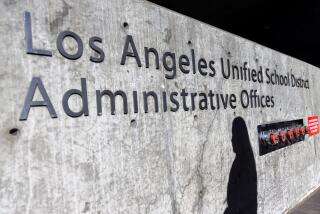Teachers Work to Catch Up in Cyberspace Race : Computers: Mobile lab gives educators a chance to find out more about what many of their students already know--how to use the Internet.
- Share via
HUNTINGTON BEACH — Teacher Kathy Ehlert sat staring at a computer screen with the same confused look she might see on one of her students trying to master a new subject.
Ehlert had logged on to the Internet for the first time and was finding the World Wide Web a bit daunting.
“Right now, this is a little overwhelming for me,” she said, sliding a computer mouse around a bright red pad. “This is really new.”
Ehlert, who teaches English as a second language at Culverdale Elementary School in Irvine, was among dozens of teachers who became students themselves last week, attending class in a state-of-the-art traveling computer lab stationed outside College View Elementary School in Huntington Beach.
The lab, which concluded its visit Friday, is a far cry from the classic bookmobile. The 48-foot tractor-trailer has 26 computer terminals and its own satellite dish for Internet access. A project of the California state university system and the state Department of Education, it has been used this summer to bring the Internet and other cyberstuff to teachers throughout the state.
Walking down the narrow aisle between two long rows of computers, Rachel Carlson, a technology coordinator for the Huntington Beach Union High School District, patiently helped the teachers enter cyberspace, answering their questions and calming their fears.
“The kids are taking to all of this quite easily, but the teachers are a bit intimidated,” Carlson said. “But they need to find their way into this and take the plunge. This program is all about how to use the Internet in the classroom, how to use it as a professional and how to get your students involved.”
The teachers, many of whom paid the $75 course fee out of their own pockets, were taught how to use the Internet as a learning and teaching tool. The goal is to encourage students to read beyond their textbooks by entering cyberspace, where they can access anything from libraries to music.
But Carlson said educators are facing some reluctance from parents because of reported abuses of the Internet, ranging from accessing pornography to corresponding via computer with anonymous users.
“I’d say there are about 3% of wigged-out people creating the mischief,” Carlson said to the teachers. “What we should be hearing about instead are all the exciting and wonderful things you can do on the Web. It’s slick, gorgeous and easy to use. You’ll love it and your kids will love it.”
For many of the teachers--most of whom have at least some computer training--exploring cyberspace is a strange new world.
“In a way, I feel that I’m the student,” said Katherine Arguijo-Flaiz,of the Orange County Department of Education. “The kids seem to be much more comfortable than we are, so we want to make sure that we know what we’re doing.”
Others agree that the time has come for them to catch up with their students, many of whom have already mastered the Internet and grew up playing computer games.
“Teachers have to keep up because times have changed,” said Nancy Smith, a teacher at Patton Elementary School in Garden Grove. “Kids have changed and they have become a lot more sophisticated than they were when I first started teaching. Computers seemed so far away. It’s unbelievable how much progress has been made.”
Karla Cochran, who teaches seventh and eighth grade at Sowers Middle School in Huntington Beach, said that when she had a computer installed in her classroom, she had a student help her get on-line.
“When I started teaching 20 years ago, we didn’t even know what a computer was,” she said. “I just got into it last year and I find it exciting and overwhelming sometimes. But I think at this stage, you can’t be afraid and must be ready to venture into the real world.”
Still, the teachers lament the fact that the Orange County bankruptcy--and its damaging impact on school district budgets--will make it far more difficult for schools to join the Internet. Linking up is a costly procedure, especially at older campuses where installation could involve adding underground cables at a cost of about $60,000, Carlson said.
“The schools, unfortunately, are behind,” said Lisa Roelke, a second grade teacher at Lincoln Elementary School in Newport Beach. “It’s a money issue. As teachers, we want more. The kids need to be prepared from an early age.”
More to Read
Sign up for Essential California
The most important California stories and recommendations in your inbox every morning.
You may occasionally receive promotional content from the Los Angeles Times.













